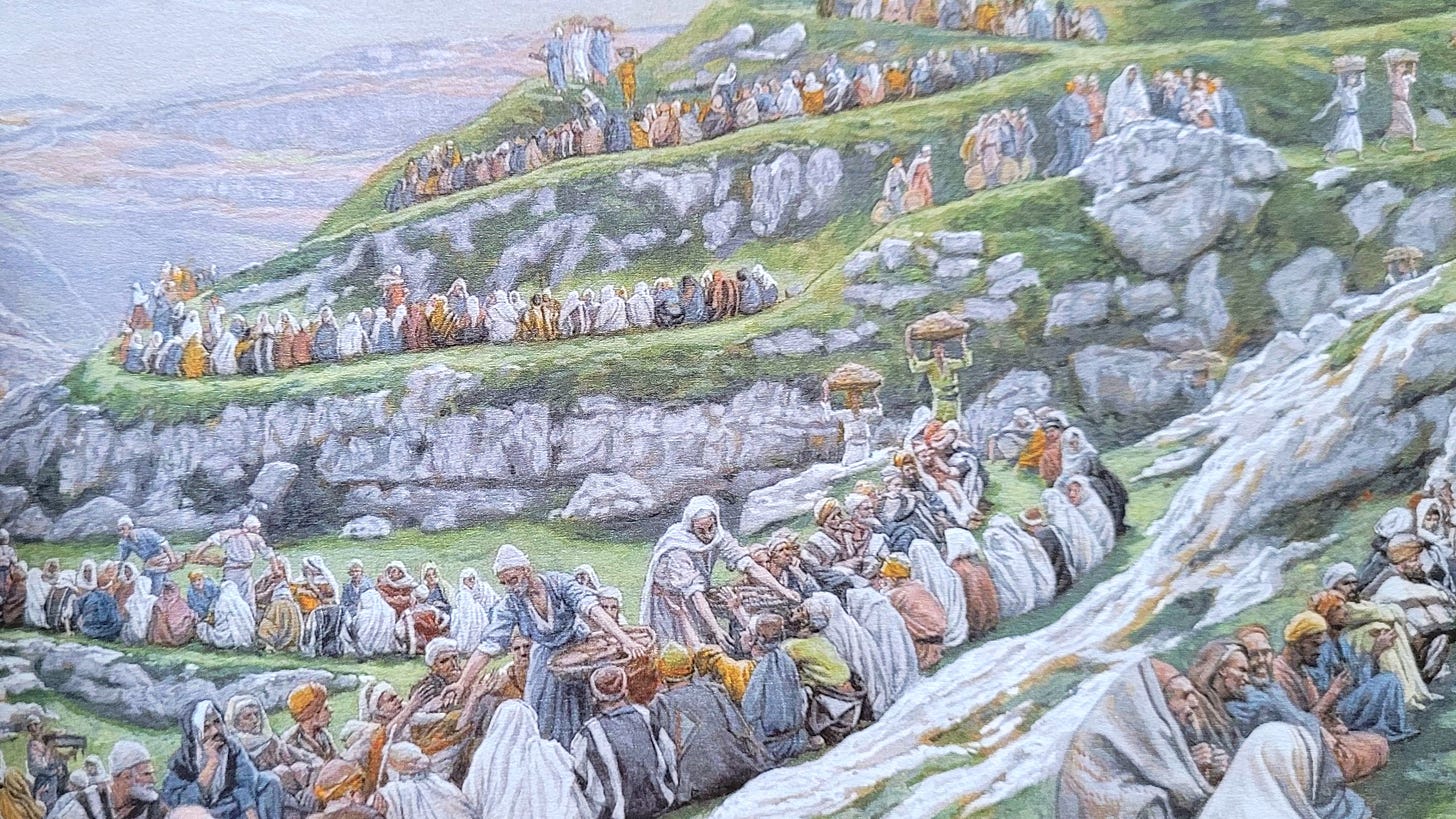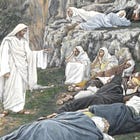What does the multiplication of loaves teach about the Church and the Apostles?
In feeding the five thousand, Christ prepared the Apostles for their priestly and juridical mission.

In feeding the five thousand, Christ prepared the Apostles for their priestly and juridical mission.
Editor’s Notes
In this piece, Fr. Coleridge tells us…
How Christ worked a solemn miracle that foreshadowed the Mass and prepared the priesthood.
That his use of created things and chosen ministers reflects the entire logic of the Incarnation.
Why every detail—the order, the baskets, the fragments—was full of sacramental meaning.
He shows us that the multiplication of loaves was no mere relief of hunger, but a foreshadowing of the Holy Eucharist and the mystery of the Church.
In light of Coleridge’s comments on the attentiveness and boundless generosity of our Saviour, we cannot help but think of the situation in the Church today. While there are many theories about what is happening and why—and while not all can be correct—this miracle should remind us of the goodness of God and his care for those who strive to follow him.
“Be you humbled therefore under the mighty hand of God, that he may exalt you in the time of visitation: casting all your care upon him, for he hath care of you.” (1 Peter 5. 6-7)
For more context on this episode, its significance and its place in the Roman Liturgy, see here:
Feeding the Five Thousand
The Training of the Apostles, Part IV, Chapter VII
St. Matt. xiv. 13-21; St. Mark vi. 30-34; St. Luke ix. 10-17; St. John vi. 1-13.
Story of the Gospels, § 72
Burns and Oates, London, 1885
Headings and some line breaks added.
Sung on the Fourth Sunday of Lent
Part I: Why did Christ and his Apostles withdraw before feeding the five thousand?
Part II: Why did Christ wait until evening to feed the multitude?
Part III: What does the multiplication of loaves teach about the Church and the Apostles?
Part IV: Was Christ thinking of the Holy Eucharist when he multiplied the loaves?
Arrangement of the crowds
It must now have been manifest to the Apostles that our Lord was about to work some great miracle. Nor could the multitude themselves have been without some impression of what was coming. For it is not easy to control so large a number as five thousand men at a word, and yet there seems to have been no resistance or hesitation as to their obedience.
‘Now there were about five thousand men. And He commanded that they should all sit down in companies on the green grass.’
It was early in the year, and the grass had not yet been withered or dried up by the scorching sun, for we are told by St. John that this miracle was wrought about the time of the Pasch, a little probably before the time for the annual pilgrimage of the Galileans to Jerusalem.
‘And He said to His disciples, Make them sit down by fifties in a company; and they sat down in ranks, by hundreds and fifties.’
In this way provision was made for the perfect order of the multitude, and for the easy and rapid distribution of the bread. For the twelve Apostles could thus take each eight or nine fifties, and the distribution would have been finished in a comparatively short time.
Moreover, this arrangement gave occasion for a greater air of solemnity, such as befitted a banquet which was the fruit of the extraordinary beneficence of God. It made the miracle more evident to all, and as the evidence of the miracle grew more and more clear and conspicuous, it prompted and made easy the religious and devout reception of this heavenly food from the hands of the Apostles, as if it were a sort of anticipation of the great communions of so many thousands, which are not uncommon in churches after a great mission, or on the occasion of some great festival.
Actions of our Lord
All the motions and actions of our Lord in this great miracle are carefully noted and recorded by the Evangelists, and the scene must have impressed itself in a singular manner on the minds of the Apostles.
‘And taking the five loaves and the two fishes, looking up to heaven, He blessed and broke the loaves, and gave to His disciples to set before them, and the two fishes He divided among them all. In like manner also of the fishes, as much as they would. And they did all eat and were filled.
‘And when they were filled, He said to His disciples, Gather up the fragments that remain, lest they be lost. They gathered up, therefore, and filled twelve baskets with the fragments of the five barley loaves and of the fishes, which remained over and above to them that had eaten.’
The miracle unasked for
It cannot be doubted that every detail of the circumstances of this wonderful act of love had been arranged in the Providence of God, so as to have some deep spiritual meaning, and the miracle and all its details is itself a figure, a promise, and a prophecy. The needs of the people were, after all, not very great, for they were not far from the neighbouring villages, as the Apostles suggested, and they spoke as if they themselves might have bought bread enough for them, at least so as to give to each a little, enough to stay hunger, though not enough to satisfy fully.
Thus the necessity for a miracle was not very great in itself, and this was also the case with the other great sacramental miracle of the change of the water into wine at the marriage-feast. Again, the miracle was not asked for, except by the needs of the people, such as they were, for no one seems to have conceived the thought that our Lord would provide in this magnificent way for a necessity not very great.
In this respect there is a contrast between this and the miracle of the wedding-feast. For in that case our Blessed Lady was present, and her heart was far more able to fathom the depths of love and beneficence in our Lord than the hearts of the Apostles. She did not hesitate to ask, and she understood the silent consent conveyed in our Lord’s answer to her, and so persevered in her hope that her prayer would not be denied. If she had been present at this scene on the mountain-side, she would have been content to say, ‘They have no food!’
The Father Coleridge Reader is a labour of love. But curating, cleaning up and publishing these texts takes a lot of time. Every now and then, we have to make one of the posts for members only, in order to keep it going.
Please consider joining us with a subscription!




